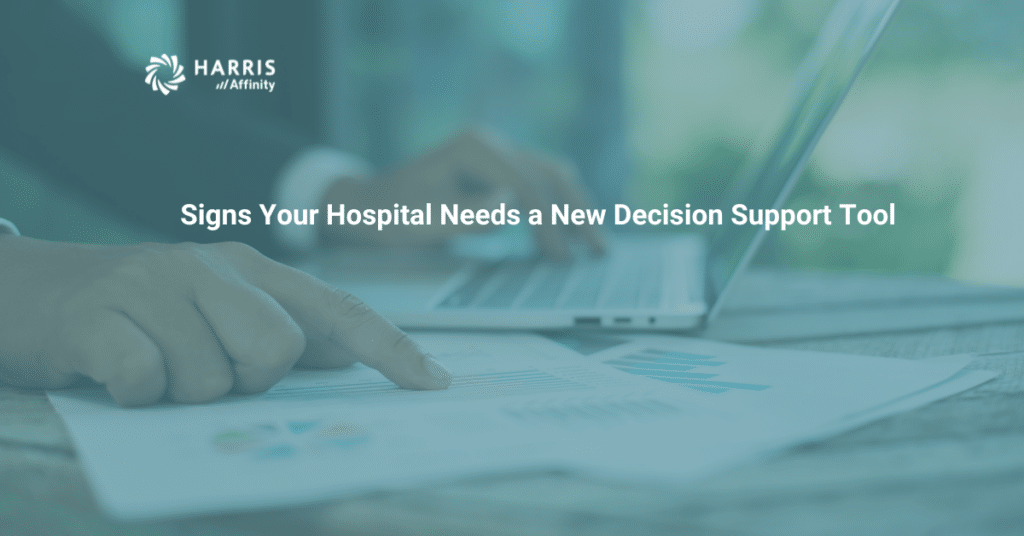When healthcare spending is estimated to reach $6 trillion by 2027, it is vital that you evaluate your financial performance. For the success and survival of your hospital, it is imperative that you have an accurate costing system in order to improve decision making and financial performance with detailed, precise, and conclusive information. Patients today are expecting effective and efficient care that is centered around value, but as a provider it can feel like a choice between cost and quality. Whether your hospital doesn’t utilize a decision support infrastructure, or your current one just isn’t working for your needs, these signs indicate that it is time to invest. Continue reading to see how increasing costs, declining profitability, increasing complexity, and costing inaccuracy can be the warning signs that it is time to make a change, so you don’t have to choose.
Solutions for Healthcare and Hospital Budgeting Problems
Increasing Costs
If your costs are continuously increasing it might be a sign that there are inefficiencies within your system, and employing a decision support tool can pinpoint these and help reduce your expenses. The first step to reducing your costs is figuring out what your current costs are. Assigning specific costs to each patient will give your organization insight into the true cost of care for each individual patient and identify points where your system could be improved due to inefficiencies or misinformed decisions. The pressure for hospitals to deliver cost savings becomes a challenging task when value and high-quality care is expected. Utilizing an accurate costing system “providers are achieving savings of 25% or more by tapping opportunities such as better capacity utilization, more-standardized processes, better matching of personnel skills to tasks, locating care in the most cost-effective type of facility, and many others.” Improving your decision support system is the first step you need to take to sustain your institution.
Declining Profitability
Even though healthcare spending is growing every year, it has become quite common for hospitals to have decreasing or low profitability, especially when evaluating the specific services they offer at an individual level. Although a specific service may not be profitable, the hospital may not be able to discontinue it. With a decision support infrastructure, you can focus on your cost management, and analyze your revenues and expenses in detail. Accurate costing information will help you make more informed decisions for your hospital to improve their profitability.
Download Compelling Evidence for ABC in Healthcare
Increasing Complexity
If you are a growing organization, or you offer different services in different departments, then a costing strategy to allocate expenses to each patient on a case-by-case basis is the most effective way to determine the true cost of healthcare. Investing in a decision support tool that can narrow down each expense and allocate it to a specific patient allows your hospital to determine inefficiencies in your system and improve the allocation of specific expenses while optimizing resource utilization. Not all patients are the same, and your decision support tool should account for that. Without accurate and detailed insights into the cost of care you are unable to conclusively evaluate the financial, clinical, and patient aspects of your organization that drive decision making.
Costing inaccuracy
Accuracy is a vital part of a decision support tool. Although your current method might be precise, if it is not accurate then you might not be making the best decisions for your organization, as they are misinformed. Without accurate information nothing else matters, comparing your current strategy with another one can show where yours might be lacking and improvements you can make by changing to a different costing method for more informed decision making. Using a costing strategy such as Harris Affinity (ADS) your organization’s financial, clinical, and patient data are used to create an accurate full picture instead of basing decisions on just one.
While the “healthcare system is struggling with rising costs and uneven quality,” if you are experiencing any of these signs it might be time to invest in a decision support tool. Utilizing an accurate decision support tool can enable your organization to provide your patients with the high level of care that you strive to maintain while providing you with the information you need to make informed decisions. Using Harris Affinity (ADS) will improve your understanding of patient costs, reimbursement, and profitability through a combination of financial, clinical, and patient activity data.

